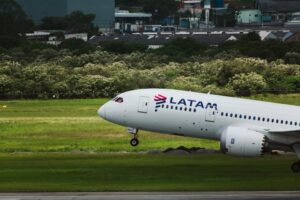
Ten days before Roberto Alvo (MBA 2000) was due to take up his post as CEO of LATAM, the South America-based airline and the 12th largest carrier in the world, the COVID-19 outbreak was declared a pandemic by the World Health Organization. Lockdowns were imposed, borders closed, and almost all flights cancelled around the world. He makes the wry observation: “I’m still looking into my contract – where did it say that I had to deal with this?”
Within the space of three weeks, LATAM’s operations fell to running at just 4% of pre-pandemic levels. Without a wealthy government with a hard currency to bail it out, there was no state support and the business had to file for Chapter 11 bankruptcy protection. Few executives would ever have to face a crisis of such a scale. The immediate needs included repatriating thousands of stranded passengers, and scaling back the size of the operation.

Particularly challenging was the uncertainty. “You don’t know if this is going to take six months, a year, two years. So you resize yourself to a level where you think that it’s a right-sizing but you don’t have a clue.”
In total, some 16,000 posts had to be lost from a workforce of 43,000, while instilling a sense of direction and strengthened morale was a challenge for those who remained. Some two years after the strictest period of lockdown, the airline was still in bankruptcy protection, running at 70% of prelockdown traffic.
“Many people talk about the solitude of the role when you have to make decisions. In my experience, I don’t have a problem making a US$50 million decision – that’s what I’ve done over a 25-year career – the real solitude of the role has been when, two months after the start of the pandemic, you know that this is not coming back quickly, that this is for the long run. And people look at you and they say you are going to save us.”
Yet there were hidden benefits to dealing with an existential crisis.
The real possibility of having to cease to trade altogether forced a deeper level of discussion among the business’s leaders, and led to a more adaptable business emerging afterwards.
“We asked ourselves the question: what is it that we need to do in the future to get the right to exist? Because now we’re threatened we can disappear, we can actually disappear. And that has allowed us to change much faster than what we would have done in any other circumstance.”
Roberto Alvo read physics at university, and qualified as a civil engineer, working in the mining sector in Chile, but was increasingly drawn towards roles that offered broader managerial responsibilities. He studied for his MBA at the age of 31, and describes his year at Lausanne as life-changing. Asked to describe particular learning moments, he declines to specify particular courses or case studies, saying that “the learning was the year’s experience – the living of everything that happened.”
If there was one most memorable experience, it was the summer TIE project, in which he and some fellow alumni took on the formidable challenge of cycling the most gruelling stage of the Tour de France. This involved 210 kilometers through the Alps over two days, with five climbs of over 2,000 meters. It was impactful in instilling the personal confidence that he could realize achievements previously considered impossible.
“I think that a big learning is you never know what your limits are until you try.”
In a complementary way, living in Europe, working closely with managers from around 50 nationalities, gave him the confidence to be able to lead a global team. Chile in 2000, when he took the MBA, was not highly integrated in the global economy, so this international exposure enabled him to mature as a leader.
He believes strongly that the key to success in a career is to grasp the opportunities around you, rather than focus on a far-off goal.
“You make your career by just doing the things you do … you have your potential, and most likely you will get to your potential as long as you just genuinely out of a crisis work – try to do the best for you and for the company you work with. So don’t get concerned about your growth or your speed of growth. You’ll get there.”
Heeding such advice also enables the manager to be responsive and deal with unexpected events. If your company’s activities plummet suddenly to just 4% of previous trading levels, owing to a global event beyond your control – there may nonetheless be a route out.

